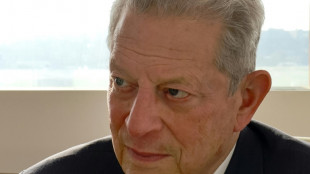
-
 Boeing strike will hurt Ethiopian Airlines growth: CEO
Boeing strike will hurt Ethiopian Airlines growth: CEO
-
Springboks skipper Kolisi wary of England's 'gifted' Smith

-
 End of a love affair: news media quit X over 'disinformation'
End of a love affair: news media quit X over 'disinformation'
-
US finalizes up to $6.6 bn funding for chip giant TSMC

-
 Scholz urges Ukraine talks in first call with Putin since 2022
Scholz urges Ukraine talks in first call with Putin since 2022
-
Zverev reaches ATP Finals last four, Alcaraz on brink of exit

-
 Lebanon rescuer picks up 'pieces' of father after Israel strike
Lebanon rescuer picks up 'pieces' of father after Israel strike
-
US retail sales lose steam in October after hurricanes

-
 Zverev reaches ATP Finals last four with set win against Alcaraz
Zverev reaches ATP Finals last four with set win against Alcaraz
-
Kerevi back for Australia against Wales, Suaalii on bench

-
 Spate of child poisoning deaths sparks S.Africa xenophobia
Spate of child poisoning deaths sparks S.Africa xenophobia
-
Comedian Conan O'Brien to host Oscars

-
 Rozner overtakes McIlroy and Hatton for Dubai lead
Rozner overtakes McIlroy and Hatton for Dubai lead
-
Mourners bid farewell to medic killed in east Ukraine

-
 Gore says 'absurd' to hold UN climate talks in petrostates
Gore says 'absurd' to hold UN climate talks in petrostates
-
Hamas says 'ready for ceasefire' as Israel presses Gaza campaign

-
 Amorim says Man Utd is 'where I'm supposed to be'
Amorim says Man Utd is 'where I'm supposed to be'
-
Japan hammer Indonesia to edge closer to World Cup spot

-
 Jeff Beck guitar collection to go under the hammer in January
Jeff Beck guitar collection to go under the hammer in January
-
Veteran Ranieri has 'no time for mistakes' on Roma return

-
 Van Nistelrooy says he will 'cherish' Man Utd memories in farewell message
Van Nistelrooy says he will 'cherish' Man Utd memories in farewell message
-
IAEA chief tours sensitive Iran nuclear plants

-
 Pompeii rejects 'mass tourism' with daily visitor limit
Pompeii rejects 'mass tourism' with daily visitor limit
-
Jailed Russian poet could be 'killed' in prison, warns wife

-
 French court orders release of Lebanese militant held since 1984
French court orders release of Lebanese militant held since 1984
-
Global stocks struggle after Fed signals slower rate cuts

-
 UK economy slows, hitting government growth plans
UK economy slows, hitting government growth plans
-
Primary schools empty as smog persists in Indian capital

-
 Palestinians turn to local soda in boycott of Israel-linked goods
Palestinians turn to local soda in boycott of Israel-linked goods
-
Typhoon Man-yi bears down on Philippines still reeling from Usagi

-
 UK growth slows in third quarter, dealing blow to Labour government
UK growth slows in third quarter, dealing blow to Labour government
-
Chris Wood hits quickfire double in NZ World Cup qualifying romp

-
 Markets struggle at end of tough week
Markets struggle at end of tough week
-
China tests building Moon base with lunar soil bricks

-
 Film's 'search for Palestine' takes centre stage at Cairo festival
Film's 'search for Palestine' takes centre stage at Cairo festival
-
Oil execs work COP29 as NGOs slam lobbyist presence

-
 Gore says climate progress 'won't slow much' because of Trump
Gore says climate progress 'won't slow much' because of Trump
-
'Megaquake' warning hits Japan's growth

-
 Stiff business: Berlin startup will freeze your corpse for monthly fee
Stiff business: Berlin startup will freeze your corpse for monthly fee
-
Wars, looming Trump reign set to dominate G20 summit

-
 Xi, Biden attend Asia-Pacific summit, prepare to meet
Xi, Biden attend Asia-Pacific summit, prepare to meet
-
Kyrgios to make competitive return at Brisbane next month after injuries

-
 Dominican Juan Luis Guerra triumphs at 25th annual Latin Grammys
Dominican Juan Luis Guerra triumphs at 25th annual Latin Grammys
-
Landslide win for Sri Lanka president's leftist coalition in snap polls

-
 Australian World Cup penalty hero Vine takes mental health break
Australian World Cup penalty hero Vine takes mental health break
-
As Philippines picks up from Usagi, a fresh storm bears down

-
 Tropical Storm Sara pounds Honduras with heavy rain
Tropical Storm Sara pounds Honduras with heavy rain
-
Pepi gives Pochettino win for USA in Jamaica

-
 'Hell to heaven' as China reignite World Cup hopes with late winner
'Hell to heaven' as China reignite World Cup hopes with late winner
-
Rebel attacks keep Indian-run Kashmir on the boil


Costa Rican sloth antibiotics offer hope for human medicine
The fur of Costa Rican sloths appears to harbor antibiotic-producing bacteria that scientists hope may hold a solution to the growing problem of "superbugs" resistant to humanity's dwindling arsenal of drugs.
Sloth fur, research has found, hosts bustling communities of insects, algae, fungi and bacteria, among other microbes, some of which could pose disease risk.
Yet, experts say, the famously slow-moving mammals appear to be surprisingly infection-proof.
"If you look at the sloth's fur, you see movement: you see moths, you see different types of insects... a very extensive habitat," Max Chavarria, a researcher at the University of Costa Rica, told AFP.
"Obviously when there is co-existence of many types of organisms, there must also be systems that control them," he said.
Chavarria and a team took fur samples from Costa Rican two- and three-toed sloths to examine what that control system could be.
They found the possible existence of antibiotic-producing bacteria that "makes it possible to control the proliferation of potentially pathogenic bacteria... or inhibit other competitors" such as fungi, according to a study published in the journal Environmental Microbiology.
- 'No infection' -
The sloth is a national symbol in laid back Costa Rica, and a major tourist attraction for the Central American country.
Both the two-toed (Choloepus Hoffmanni) and three-toed (Bradypus variegatus) sloth species have seen their populations decline, according to the International Union for the Conservation of Nature's Red List of Threatened Species.
They live in the canopies of trees in the jungle on the Caribbean coast, where the climate is hot and humid.
American Judy Avey runs a sanctuary in the balmy jungle to care for sloths injured after coming into contact with humans or other animals.
She treats and rehabilitates the creatures with a view to releasing them back into the wild.
"We've never received a sloth that has been sick, that has a disease or has an illness," she told AFP.
"We've received sloths that had been burned by power lines and their entire arm is just destroyed... and there's no infection.
"I think maybe in the 30 years (we've been open), we've seen five animals that have come in with an infected injury. So that tells us there's something going on in their... bodily ecosystem."
Avey, who established the sanctuary with her late Costa Rican husband, Luis Arroyo, had never even heard of a sloth back home in Alaska.
Since receiving her first sloth, whom she named "Buttercup," in 1992, she has cared for around 1,000 animals.
- Penicillin inspiration -
Researcher Chavarria took fur samples taken from sloths at the sanctuary to examine in his laboratory.
He began his research in 2020, and has already pinpointed 20 "candidate" microorganisms waiting to be named.
But he said there is a long road ahead in determining whether the sloth compounds could be useful to humans.
"Before thinking about an application in human health, it's important to first understand... what type of molecules are involved," said Chavarria.
An example of this is penicillin, discovered in 1928 by British scientist Alexander Fleming, who discovered that a fungal contamination of a laboratory culture appeared to kill a disease-causing bacteria.
His discovery of the world's first bacteria-killer, or antibiotic, earned him the 1945 Nobel Prize in medicine.
However, microbial resistance to antibiotics has been a growing problem, meaning some medicines no longer work to fight the infections they were designed to treat.
Antimicrobial resistance is a natural phenomenon, but the overuse and misuse of antibiotics in humans, animals and plants has made the problem worse.
The World Health Organization estimates that by 2050, resistance to antibiotics could cause 10 million deaths a year.
"Projects like ours can contribute to finding... new molecules that can, in the medium or long term, be used in this battle against antibiotic resistance," said Chavarria.
P.Costa--AMWN


